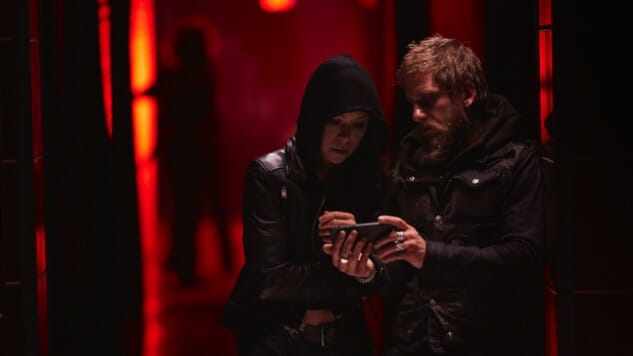Orphan Black‘s Latest Takes an Ambitious, Lost-Like Approach
(Episode 4.02, “Transgressive Border Crossing”)
TV Reviews Orphan Black
Pushing forward after its impressive, format-breaking season premiere, “Transgressive Border Crossing” cements Orphan Black’s determination to keep one foot planted firmly in the past. Somewhat literally, in fact. Indeed, far from being a one-off experiment, Beth Child’s gradual breakdown now looks to be an on-going subplot that will be interwoven with the modern day narrative through flashbacks. In keeping the two storylines properly tethered to one another, the show’s creative team has wisely chosen to connect the time periods via the device of security footage, with Sarah and Art viewing the more superficial elements of a specific event in Beth’s life and the flashbacks filling in the full story.
While such a Lost-esque technique is the quickest way to my heart, it’s also worth considering that ambitious plotlines on Orphan Black have typically resulted in either an overly dense mess, or a relative anti-climax. Whether or not the writers can keep up this level of intrigue over the course of the season, only time will tell.
Plot-wise, the lion’s share of the episode finds Sarah—after departing her Icelandic hideout in the wake of MK’s warning last week—picking up an investigation that Beth was obsessively following after her suspension from the police. This means locating the pregnant girl that Beth corresponded with in the season premiere and, ultimately, walking into a confrontation with the Neolutionist lackies who Beth was pursuing. There’s then the more horrifying revelation that each of the clones has been embedded with some kind of worm-like tracking device in the inside of their cheeks. It’s a disturbing bit of body horror that continues to hark back to the kind of material seen back in Season One.
Elsewhere, Cosima continues to bemoan the disappearance (and probable death) of Delphine, making it not quite clear if she’s even still romantically involved with Shay. On a lighter note, a pregnant Helena must masquerade as Alison in order to get a doctor check-up, leading to some highly awkward “fake flirting” with Donnie. One thing’s for sure—after last season’s Castor plot left her with a bit more wiggle room, Tatiana Maslany looks to be back on a brutal shooting schedule. Here her docket has been increased to six clones—the central core of Sarah, Alison, Cosima and Helena plus Beth in flashbacks and the still-mysterious MK—as opposed to the traditional four or five per episode (and who knows when Rachel may re-enter into fold).
Going back to storylines that may prove problematic, however, one such example concerns Felix’s revelation regarding his birth parents. When the show first started, Felix acted as both a way to ground Sarah’s more serious-minded character, as well as just a general burst of delightful comic relief. As an actor, Jordan Gavaris has never faulted and—with the exception of the head-scratching, incest-tinged dalliance with transgender clone Tony back in Season Two—the writers usually provide him with good material. As of late, however, it has become increasingly apparent that there is a struggle to figure out what exactly to do with Felix now that Alison, Donnie and, in many ways, Helena have picked up the “goofy relief” baton. The birth parents plotline almost offers a no-win scenario—either it’s the kind of floating plotline that will end up feeling utterly divorced from the central storylines, or it inevitably loops into the major story arc in some way and the world continues to feel overly insular. Then again, this could all just be me being overly cautious, and such a subplot could turn into something quite strong.
One (albeit somewhat contrived) positive mark in the creative direction of the show comes with a throwaway line about Dyad moving away from the clone business. Between Dyad/the Neolutionists, Topside, the Castor project and the Proletheans, it was getting harder and harder to determine what shadowy organization was exactly responsible or pulling the strings for what conspiracy. By removing Dyad from the equation and pushing focus onto this strange Neolutionist angle, the writers already look to be trimming the fat and crafting a more focused season. Overall, “Transgressive Border Crossing” helps further steer the Orphan Black ship in the proper direction. And though the seeds of potential future troubles are present, the entry is nevertheless an enjoyable jaunt that helps re-introduce the show’s great characters in a more significant way.
Mark Rozeman is a Los Angeles-based freelance writer and regular contributor to Paste. You can follow him on Twitter.